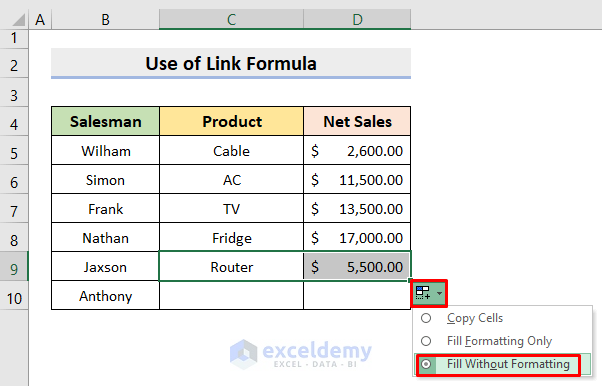5 Ways to Link Sheets in Excel Easily

In Microsoft Excel, linking sheets can revolutionize the way you handle data across multiple worksheets. This capability not only helps in maintaining organized data but also ensures that any updates in one sheet reflect automatically in linked sheets, enhancing efficiency and reducing errors. Here are five effective ways to link sheets in Excel.
1. Using Cell References

The most straightforward method to link sheets is by using cell references.
- Select a cell: Click on the cell where you want to display the linked value.
- Enter: Type
=followed by the sheet name, an exclamation mark, and the cell reference you wish to link to. For example, if you are in ‘Sheet2’ and you want to link to cell A1 in ‘Sheet1’, you would type=Sheet1!A1. - Press Enter: The linked value will now appear in the selected cell.
✅ Note: If you change the value in the original cell, the linked cell will update automatically.
2. Linking Entire Ranges

When you need to link a series of cells:
- Drag to select a range: Choose the range on the destination sheet where you want the linked data to appear.
- Enter: Type
=, then click on the tab of the source sheet and select the cells you want to link. Excel will auto-complete the formula with the correct range reference. - Press Enter: Now, the range of cells on your current sheet will dynamically update whenever changes are made in the source range.
3. Using Names for Easier Linking

Naming ranges can make linking easier, especially for repetitive tasks.
- Define Name: On the source sheet, select the range or cell you wish to name, go to
Formulas>Define Name, and give it a name like “SalesData”. - Linking: In the destination sheet, simply type
=SalesDatato link to the named range. - Advantage: This method simplifies formula creation and updates if you move the named range within the sheet.
4. Dynamic Linking with Functions

Excel functions like INDIRECT and VLOOKUP can provide dynamic linking capabilities.
- INDIRECT: Use
=INDIRECT(“‘Sheet1’!A1”)to link to a cell or range based on a string reference. This function is particularly useful for creating more flexible references. - VLOOKUP: Combine with
=VLOOKUP(lookup_value, Sheet1!A1:C100, column_index, FALSE)for linking to specific data within tables.
❗ Note: Be cautious with circular references which can occur when linking sheets recursively.
5. Hyperlinks to Different Sheets

If your objective is more about navigation rather than data linking:
- Insert Hyperlink: Right-click on the cell where you want to add the hyperlink, choose
Hyperlink, and then selectPlace in This Document. - Select Sheet: Choose the sheet you want to link to and optionally select a cell or named range within that sheet.
- Text to Display: Enter text for the hyperlink or leave it blank to use the cell’s content.
This approach is useful for creating an index or table of contents to navigate through your workbook easily.
Linking sheets in Excel can streamline your data management process. It ensures that you have a dynamic, interconnected workbook where changes are reflected instantaneously across sheets. Whether you're linking for simple data references or for complex data management, Excel provides multiple methods tailored to your needs. From using basic cell references to employing sophisticated functions, understanding these techniques can significantly boost your productivity and accuracy.
To summarize, by mastering these linking techniques, you:
- Gain better control over your data flow.
- Minimize errors through automation.
- Enhance the presentation and accessibility of your data.
Can I link to a cell that does not exist yet?

+
Yes, but any formulas referencing a non-existent cell will show as #REF! errors until the cell is created.
How do I update multiple links at once?

+
Use the Data tab, then Edit Links. Here you can update, break or change source for multiple linked sheets.
What happens if I delete a sheet that’s linked?

+
Any links or references to the deleted sheet will result in #REF! errors in cells using those references.



